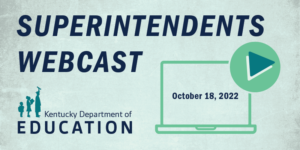
Superintendents across the state heard how the Kentucky Department of Education’s (KDE’s) equity playbook is helping one school district in its mission to serve all students.
Boone County Superintendent Matthew Turner joined KDE Deputy Commissioner and Chief Equity Officer Thomas Woods-Tucker at KDE’s monthly Superintendents Webcast on Oct. 18 to talk about the new playbook and his district’s experience.
The equity playbook provides district and school leaders with personalized coaching on evidence/research-based practices, content and resources to address opportunity gaps in one or more of the following areas:
- Student achievement;
- Utilization of funding and resources;
- Disproportionality relative to student discipline;
- Culture and climate; and
- Highly effective staff and high-quality instructional resources.
Boone County is in the first cohort for the equity playbook’s executive coaching.
“We’re real excited about the progress we’ve made as well as the professional development that has been made,” said Woods-Tucker.
The equity playbook, which launched this fall, aligns with United We Learn, the vision for the future of public education in Kentucky. The playbook is an initiative designed to improve the state’s five equity pillars: student achievement; utilization of funding and resources; high effective staff and high-quality instructional resources; disproportionality relative to student discipline; and culture and climate.
“At the center of our equity playbook is personalized executive coaching,” Woods-Tucker said. “Each school district has identified up to eight participants and we are providing that coaching free of charge. For our teachers, they don’t have to leave their districts.
“We know that executive coaching is one of the more effective approaches to increasing student outcomes.”
Turner said Boone County has 28 schools and programs. Among the district’s students, there are 63 languages spoken at home, 42% of students receive reduced-price meals and 14% of students have a disability.
To learn at higher levels, Turner said the students want to feel accepted and loved. He said they want to know the school knows them, their families and their background. He said students need to know people at the school care and the school wants to help them.
The equity training is aligned with efforts Boone County has made to close achievement gaps with students, Turner said.
“The people we have in the program right now – all of our high school principals, some of our middle school principals – they are very, very pleased and very excited and really like some of the work, especially the coaching aspect,” he said. “It provides some structures, some processes and strategies for closing gaps.”
The second cohort begins in January and the third in the fall of 2023.
School Report Card
The release of the 2021-2022 School Report Card on Oct. 18 also was discussed. As expected, the data showed that the COVID-19 pandemic had a deep impact on students and schools as they continue to recover from the interrupted learning over the past two years.
Assessments were fully administered to more than 383,000 students in grades 3 through 8 and 10 through 11 during the spring of 2022. Accountability and federal statuses – such as Comprehensive School Improvement and Targeted School Improvement – are being reported for the first time since 2019.
Kentucky Commissioner of Education Jason E. Glass said Kentucky’s results are consistent with that of other states.
“There’s nothing in this data that is surprising to us,” Glass said. “It wasn’t surprising to me. It is reflective of what we’ve been hearing from out formative assessment data that has been collected locally. That is what we’ve been seeing nationally as other states release their data and what we’ve seen with national and international test data releases.”
He said there has been some recovery already on ACT performance that will be seen in next year’s scores.
“There’s lots of federal money available to support that so we should expect to see continued recovery and improvement happening with our schools as time goes on,” he said.
Kentucky has received more than $2 billion in federal funding through the American Rescue Plan Act to help accelerate learning and get additional support to districts and students who need it the most.
Other Updates
Also at the meeting, Glass discussed with the superintendents the 10 regulations pertaining to charter schools that were approved by the Kentucky Board of Education at its Oct. 11-12 meeting. He said it was necessary to approve the regulations to conform to the requirements set by House Bill 9, a bill that modified Kentucky’s charter school law and set up a funding mechanism for charter schools.
Glass acknowledged there are some constitutional issues with the statute that have carried over into the regulations, and noted the KBE struggled with passing them.
Superintendents also learned that helping displaced families and students in flood-impacted districts in eastern Kentucky is now the focus during the holidays. While relief efforts continue, the impacted districts also are working to help families by providing Thanksgiving meal outreach and gifts.
Finally, superintendents were told a new Kentucky United We Learn Council is being formed with the purpose of giving a broad voice on the learning process to stakeholders. The council also will evaluate and recommend strategic practice, policy and investment ideas to state policymakers and the state at large.
The next Superintendents Webcast will be Nov. 15.




Leave A Comment